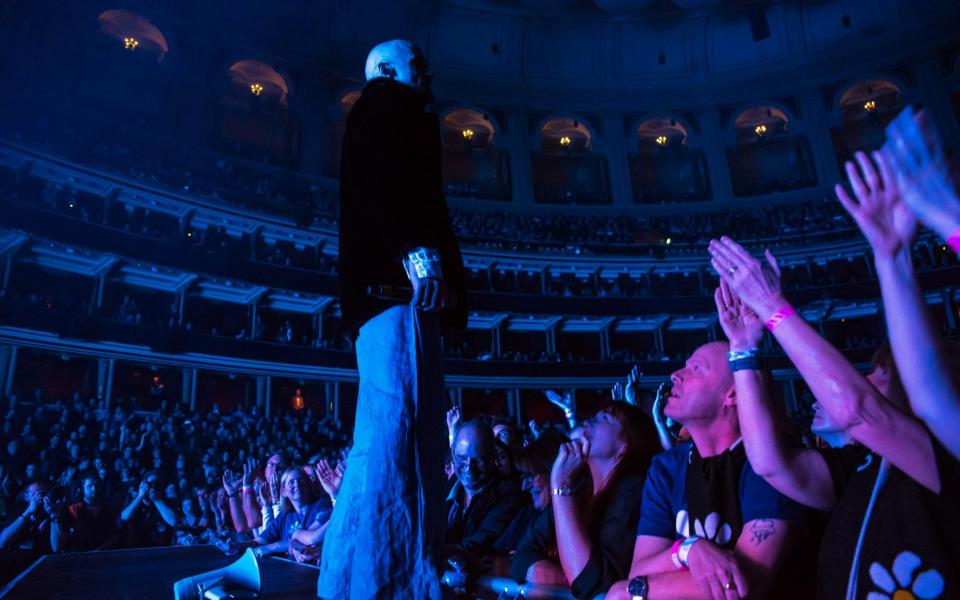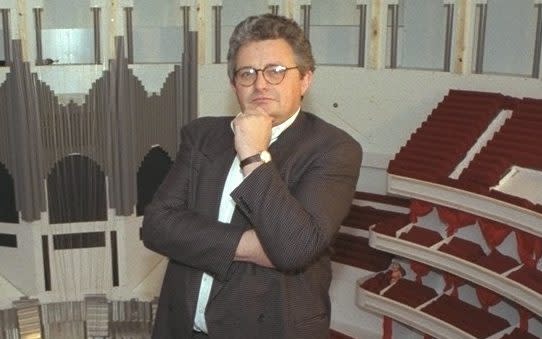Patrick Deuchar, executive who transformed the fortunes of the Royal Albert Hall – obituary

Patrick Deuchar, who has died aged 71, was a former farmer who became a high-profile chief executive of the Royal Albert Hall, a venue that he energetically promoted as “the nation’s village hall”; under his aegis the hall’s use widened beyond the annual BBC Proms, popular classics concerts and Eric Clapton gigs to embrace spliff-toting rock bands, Trekkies, Sumo wrestlers, arena opera, tennis tournaments and even a promotional launch for the Fiat Cinquecento.
The hall had originally been the idea of Prince Albert, whose vision was for a great public building dedicated to the pursuit of knowledge that would complement the cultural mecca he had founded in 87 acres of South Kensington. Albert died in 1861 before work had begun, but Queen Victoria was determined that his wish be fulfilled, laying the foundation stone in 1867 and dedicating the completed building four years later.
Nearly 120 years later both the building and its programming were in urgent need of modernisation. Deuchar was horrified to learn that the venue had not been rewired since 1957 – the brightest light he could use was a 40-watt bulb – and that patrons were being sent up or down three flights of stairs to visit the lavatory. “We must let people eat, drink and have a pee,” he told the journalist Rosie Millard.
Arriving in 1989, Deuchar insisted that the business of creating art was for others; his mission was for the hall to become the venue of choice for promoters and the public, even if that meant it doubling as a glorified conference centre. “I am not an artistic director,” he declared. “I want to attract business from banquets to charity shows and large-scale celebrations.”
One of his first moves was to drop the ban on pop concerts that had been imposed in March 1972 after only one of 23 gigs the previous year had passed off without disorder; in 1968 an American flag had been burnt on stage by the Nice.
Deuchar’s programming for the unsubsidised hall was ambitious: announcing a residency by the Montreal-based Cirque du Soleil, the ever-exuberant chief executive declared himself unconcerned by the risk of high-flying Canucks colliding with the hall’s acoustic saucers that dangle from the ceiling. “It’ll be just fine,” he said. “And the people who always complain they can’t see the show from the upper circle will be confounded.”
In one 10-day period in 1995 the hall welcomed 4,000 schoolchildren for the Faraday lectures; 11,000 Trekkies to greet the actor Patrick Stewart, who starred in Star Trek: The Next Generation; 7,000 Cyndi Lauper fans; and 900 admirers of the Towards Humanity Arab-Israeli music show. The following year, President Mandela of South Africa visited with the Queen during his state visit for a concert entitled Two Nations Celebrate.
Some traditionalists grumbled about Deuchar bringing the hall into disrepute, not least when it was hired by the fundamentalist London Church of Christ, an offshoot of an American sect. “They pay their bills promptly,” he shrugged.

He insisted that the most vocal complaints came when 160 members of the Bolshoi Ballet pirouetted in the round during a five-week, £3 million season in 1992. “People were outraged,” he said. “Apparently it’s just not on to have to look at ballerinas’ bottoms.”
Patrick Lindsay Deuchar was born on March 17 1949, the elder son of David Deuchar and his wife Marian (née Davies). He was educated at Christ’s Hospital, Horsham, and Lackham College of Agriculture in Wiltshire, from where he moved into farming near Newbury in Berkshire.
After about five years he began writing for Farmer’s Weekly, which led to a career in public relations, and by 1977 he was PR manager for the Earls Court-Olympia exhibition centre. From there it seemed a natural move in 1981 to World Championship Tennis, which he nurtured into a vast enterprise of more than 100 professional tournaments with a multimillion-pound prize fund.

Deuchar, an arena-sized man with arena-sized spectacles, was appointed chief executive of the Royal Albert Hall in 1989. His plans for the building were as impressive as his programming, with much of the work supported by funds from the National Lottery: the main entrance would be returned to the south of the hall; additional restaurants, bars, shops and lavatories were created; new loading areas and backstage facilities were built; within the auditorium itself seating was upgraded and sightlines improved; and the death-defying racetrack around the hall was transformed into a pedestrian piazza.
Construction work had barely started when the 48-year-old Deuchar resigned after less than nine years in post because of ill health, leaving the physical transformation of the hall to be completed by David Elliott, his former director of finance and administration. Deuchar took up a series of short-lived executive positions and was spoken of as a potential chief executive of the V & A, but instead retired to Devon.

On one occasion he was lined up by the business community as a London mayoral candidate in the hope that he could bridge the capital’s political divide and solve its public transport problems, but the idea was swiftly dropped after a rebellion by both Labour and the Conservatives.
With family roots in Angus, Deuchar enjoyed visiting Scotland. He had friends in Gruinard Bay, in the north-west of the country, whom he visited regularly. Having been raised in the Anglican church he retained an attachment to the faith.
Patrick Deuchar married Gwyneth Miles in 1973; the marriage was dissolved and in 1997 he married Liz Robertson, an actress, singer and the widow (and eighth wife) of the lyricist Alan Jay Lerner. She survives him with their daughter, and a son and a daughter from his first marriage.
Patrick Deuchar, born March 17 1949, died September 10 2020

 Yahoo News
Yahoo News 